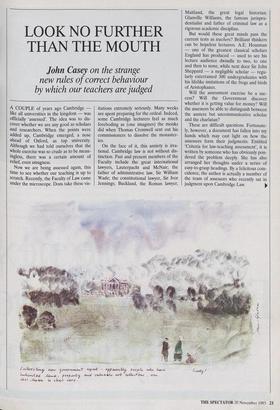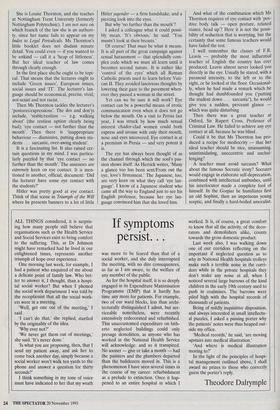LOOK NO FURTHER THAN THE MOUTH
John Casey on the strange
new rules of correct behaviour by which our teachers are judged
A COUPLE of years ago Cambridge like all universities in the kingdom — was officially 'assessed'. The idea was to dis- cover whether we are any good as scholars and researchers. When the points were added up, Cambridge emerged, a nose ahead of Oxford, as top university. Although we had told ourselves that the whole exercise was so crude as to be mean- ingless, there was a certain amount of relief, even smugness. Now we are being assessed again, this time to see whether our teaching is up to scratch. Recently, the Faculty of Law came under the microscope. Dons take these vis- itations extremely seriously. Many weeks are spent preparing for the ordeal. Indeed, some Cambridge lecturers feel as much foreboding as (one imagines) the monks did when Thomas Cromwell sent out his commissioners to dissolve the monaster- ies.
On the face of it, this anxiety is irra- tional. Cambridge law is not without dis- tinction. Past and present members of the Faculty include the great international lawyers, Lauterpacht and McNair; the father of administrative law, Sir William Wade; the constitutional lawyer, Sir Ivor Jennings; Buckland, the Roman lawyer; Maitland, the great legal historian; Glanville Williams, the famous jurispru- dentialist and father of criminal law as a rigorous academic discipline.
But would these great minds pass the current tests as teachers? Brilliant thinkers can be hopeless lecturers. A.E. Housman — one of the greatest classical scholars England has produced — used to see his lecture audience dwindle to two, to one and then to none, while next door Sir John Sheppard — a negligible scholar — regu- larly entertained 300 undergraduates with his lifelike imitations of the frogs and birds of Aristophanes.
Will the assessment exercise be a suc- cess? Will the Government discover whether it is getting value for money? Will the assessors be able to distinguish between the austere but uncommunicative scholar and the charlatan?
These are difficult questions. Fortunate- ly, however, a document has fallen into my hands which may cast light on how the assessors form their judgments. Entitled `Criteria for law-teaching assessment', it is written by someone who has obviously pon- dered the problem deeply. She has also arranged her thoughts under a series of easy-to-grasp headings. By a felicitous coin- cidence, the author is actually a member of the team of assessors who recently sat in judgment upon Cambridge Law. 1 She is Louise Thornton, and she teaches at Nottingham Trent University (formerly Nottingham Polytechnic). I am not sure on which branch of the law she is an authori- ty, since her name fails to appear on my Index to Legal Periodicals. Ms Thornton's little booklet does not disdain minute detail. You could even — if you wanted to be unkind — call it a 'heap of littleness'. But her ideal teacher of law comes through clearly enough.
In the first place she/he ought to be topi- cal. That means that the lectures ought to include 'Green issues', European issues, social issues and 'IT'. The lecturer's lan- guage should be economical, precise, vivid, not-sexist and not racist.
Then Ms Thornton tackles the lecturer's 'postures/expressions'. The dos and don'ts include, 'stable/restless — e.g. walking about' (the restless option clearly being bad); 'eye contact — not further than the mouth'. Then there is 'inappropriate behaviour — dismissive, putting down stu- dents . . sarcastic, over-awing student'.
It is a fascinating list. It also raised cer- tain questions in my mind. I was particu- larly puzzled by that 'eye contact — no further than the mouth'. The assessors are extremely keen on eye contact. It is men- tioned in another, official, document: 'Did the lecturer have some eye contact with the students?'
Hitler was pretty good at eye contact. Think of that scene in Triumph of the Will where he presents banners to a lot of little Hitler jugender — a firm handshake, and a piercing look into the eyes.
But why `no further than the mouth'?
I asked a colleague what it could possi- bly mean. 'It's obvious,' he said. 'You mustn't look at their breasts.'
Of course! That must be what it means. It is all part of the great campaign against sexual harassment — that splendidly com- plex code which we must all learn until it becomes second nature. It is rather like `control of the eyes' which all Roman Catholic priests used to learn before Vati- can II. They avoided lascivious thoughts by lowering their gaze to the pavement when- ever they passed a woman in the street.
Yet can we be sure it will work? Eye contact can be a powerful means of erotic communication even when it does not go below the mouth. On a visit to Persia last year, I was struck by how much sexual interest chador-clad women could both express and arouse with only their mouth, nose and eyes uncovered. Eye contact is at a premium in Persia — and very potent it is.
The eye has always been thought of as the channel through which the soul's pas- sion shows itself. As Herrick writes, 'Many a glance too has been sent/From out the eye, love's firmament.' The Japanese, too, are very keen on what they call 'eye lan- guage'. I know of a Japanese student who came all the way to England just to see his English professor, because her eye lan- guage convinced him that she loved him. And what of the combination which Ms Thornton requires of eye contact with 'pos- itive body talk — open posture, relaxed stance, head up'? Here it is not the possi- bility of seduction that is worrying, but the certainty that some famous teachers would have failed the test.
I well remember the classes of F.R. Leavis — probably the most influential teacher of English the country has ever produced. Leavis almost never looked you directly in the eye. Usually he stared, with a paranoid intensity, to the left or to the right, or he looked at the floor. Occasional- ly, when he had made a remark which he thought had dumbfounded you (`putting the student down ... sarcastic'), he would give you a sudden, perceant glance which was quite disturbing Then there was a great teacher at Oxford, Sir Rupert Cross, Professor of Criminal Law. He failed to achieve any eye contact at all, because he was blind .
Could it be that Ms Thornton has pro- duced a recipe for mediocrity — that her ideal teacher should be nice, unassuming, unintimidating, uneccentric and unchal- lenging?
A teacher must avoid sarcasm? What about the famous Socratic irony? Socrates would engage in elaborate self-deprecation, combined with intellectual ambushes, until his interlocutor made a complete fool of himself. In the Goigias he humiliates first an old Sophist, then an impetuous young sceptic, and finally a hard-boiled amoralist. It would be a very bold faculty of philoso- phy today that would dare give him a job.
As for such signs of 'restlessness' as `walking about', was not Aristotle's school of philosophy called 'peripatetic' just because the Master had that very habit?
Wittgenstein also would have been in trouble. He would sometimes sit for 10 or 15 minutes in total silence, his head in his hands, before making a gnomic remark that left his audience in the dark. His `body talk' seems to have been far from relaxed and open: rather it suggested an anguished soul — which is what his was.
Samuel Johnson (sarcastic, intimidating, restless) once suggested that it was useless to waste criticism on 'unresisting imbecili- ty'. Ms Thornton's pamphlet may be unre- sisting, but it is no more imbecilic than many of the other documents which this assessment exercise has spawned.
You may smile, gentle reader, at these manifest absurdities. For the universities they are no smiling matter. It is by such criteria that our universities are being judged. It is by such judges they are being assessed. After an assessment money moves, appointments are frozen, depart- ments are closed.
The Government has adopted a way of assessing higher education that is as bar- barous as it is fraudulent. It ignores what is fundamental — that no one is a good uni- versity teacher because he has eye contact and positive body language, but only if he has himself engaged in original research, and has something to teach. It is good to have a glimpse behind the scenes, to see what strange ideas guide some of our assessors. In the event Cam- bridge Law was unanimously declared to be 'excellent' — which means that Ms Thornton's heart was in the right place in the end. Or perhaps the body talk of my legal colleagues was more eloquent than I had ever given it credit for.
Dr Casey is a Fellow of Gonville and Caius, Cambridge.
`1 don't think any of them have come in their cars,'












































































 Previous page
Previous page